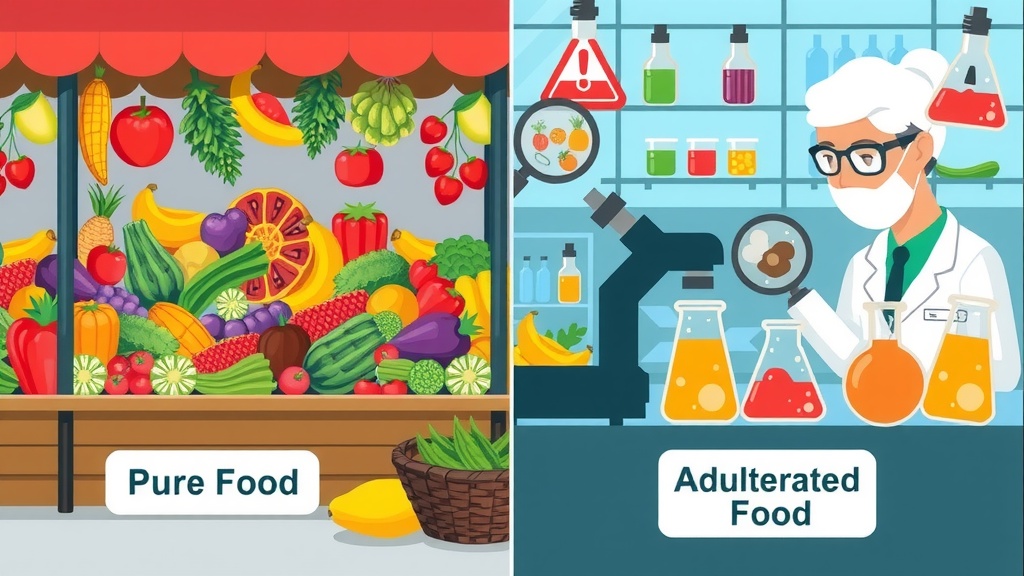Imagine biting into a juicy mango, only to discover it's been artificially ripened with chemicals. Or maybe you're enjoying a glass of milk, unknowingly diluted with water. Scary, right? This is the reality of food adulteration, a serious issue affecting us all, especially in Bangladesh. Let's dive deep into what it is, why it happens, and how we can protect ourselves.
Food Adulteration: A Threat to Our Plates
Food adulteration, in simple terms, is when the quality of food is lowered by adding harmful or non-permitted substances. Think of it like this: you're buying a beautiful painting, but someone has secretly smudged it with cheap paint. The painting still looks okay from afar, but the value and quality are compromised. That's exactly what happens when food is adulterated.
Why Should We Care About Food Adulteration?
The answer is simple: our health! Adulterated food can cause a range of health problems, from mild stomach upsets to serious illnesses like cancer. It's like playing Russian roulette with your well-being.
Understanding the Scope: Food Adulteration Paragraph for Class 6-12, SSC, HSC
Whether you're in Class 6 or preparing for your HSC exams, understanding food adulteration is crucial. It's not just a textbook topic; it's a real-world problem that affects your daily life. This guide will provide you with paragraphs of varying lengths (150, 250, and 300 words) suitable for different academic levels. We'll break down the complex aspects in a way that's easy to understand, even if you're just starting to learn about it.
Common Forms of Food Adulteration in Bangladesh
Bangladesh, like many developing countries, faces significant challenges with food adulteration. Let's look at some common examples:
- Milk: Diluted with water, sometimes even with added starch or urea to maintain consistency. Imagine drinking milk that's more water than milk!
- Spices: Turmeric powder mixed with lead chromate (a toxic chemical that adds a bright yellow color), chili powder mixed with brick dust. Who wants to spice up their food with brick dust?
- Fruits: Artificially ripened with calcium carbide (a chemical that can cause serious health problems). These fruits look tempting, but the inside story is quite different.
- Edible Oil: Mixed with cheaper, non-edible oils. It’s like buying olive oil and getting sunflower oil mixed with something questionable.
- Fish: Treated with formalin (a preservative used for dead bodies!) to prevent spoilage. This is perhaps the most disturbing example, as it poses severe health risks.
Table: Common Adulterants and Their Health Effects
| Food Item | Common Adulterant | Health Effects |
|---|---|---|
| Milk | Water, Starch, Urea | Malnutrition, Gastrointestinal problems |
| Spices | Lead Chromate, Brick Dust | Lead poisoning, Stomach disorders |
| Fruits | Calcium Carbide | Neurological disorders, Cancer |
| Edible Oil | Non-edible Oils | Liver damage, Heart problems |
| Fish | Formalin | Cancer, Kidney damage |
Why Does Food Adulteration Happen?
The main culprit is greed. Unscrupulous traders are driven by the desire to make quick profits, often at the expense of public health. Here's a breakdown of the reasons:
- High Demand: The demand for food often exceeds the supply, creating opportunities for adulteration. It's like a gold rush, but with food.
- Lack of Enforcement: Weak regulatory frameworks and inadequate enforcement allow adulteration to thrive. Think of it as a playground where the rules aren't enforced.
- Poverty: Consumers with limited income may opt for cheaper, adulterated products without realizing the risks. It's a sad reality where people are forced to choose between affordability and safety.
- Lack of Awareness: Many people are unaware of the dangers of food adulteration, making them vulnerable to exploitation. Knowledge is power, and in this case, it can save your health.
Food Adulteration Paragraphs for Different Classes
Food Adulteration Paragraph (150 Words)
Food adulteration is a serious problem in Bangladesh. It involves adding harmful substances to food items to increase profit. Common examples include mixing water in milk, adding brick dust to chili powder, and using chemicals to ripen fruits. This practice poses significant health risks, leading to diseases like cancer, liver damage, and stomach disorders. The main reasons for food adulteration are greed, high demand, and weak enforcement of regulations. To protect ourselves, we should buy food from trusted sources, check for quality marks, and raise awareness about this issue. The government and consumers must work together to stop food adulteration and ensure food safety for everyone.
Food Adulteration Paragraph Bangla Meaning: খাদ্য ভেজাল বাংলাদেশে একটি গুরুতর সমস্যা। এটি লাভের জন্য খাদ্য সামগ্রীতে ক্ষতিকারক পদার্থ মেশানো জড়িত। সাধারণ উদাহরণগুলির মধ্যে রয়েছে দুধে জল মেশানো, মরিচের গুঁড়ায় ইটের গুঁড়া মেশানো এবং ফল পাকাতে রাসায়নিক ব্যবহার করা। এই অভ্যাস স্বাস্থ্যের জন্য মারাত্মক ঝুঁকি তৈরি করে, যা ক্যান্সার, লিভারের ক্ষতি এবং পেটের রোগের মতো রোগের দিকে পরিচালিত করে। খাদ্য ভেজালের প্রধান কারণ হলGreed, চাহিদা বেশি এবং প্রবিধান প্রয়োগের দুর্বলতা। নিজেদেরকে রক্ষা করার জন্য, আমাদের উচিত বিশ্বস্ত উৎস থেকে খাবার কেনা, গুণমানের চিহ্ন পরীক্ষা করা এবং এই বিষয়ে সচেতনতা বাড়ানো। সরকার এবং ভোক্তাদের একসঙ্গে খাদ্য ভেজাল বন্ধ করতে এবং সবার জন্য খাদ্য নিরাপত্তা নিশ্চিত করতে কাজ করতে হবে।
Food Adulteration Paragraph (250 Words)
Food adulteration is a widespread and alarming issue in Bangladesh, where unscrupulous traders compromise the quality and safety of food for financial gain. It refers to the practice of adding or substituting inferior or harmful substances to food products, thereby deceiving consumers and endangering their health. Common examples include the dilution of milk with water and the addition of starch to thicken it, the mixing of brick dust or artificial colors in spices like chili and turmeric powder, and the use of calcium carbide to artificially ripen fruits. Fish is sometimes treated with formalin, a dangerous chemical used to preserve dead bodies, to prevent spoilage.
The consequences of consuming adulterated food are severe, ranging from gastrointestinal problems and malnutrition to more serious ailments like liver damage, kidney failure, and cancer. Children and the elderly are particularly vulnerable. The root causes of food adulteration include high demand for food products, weak regulatory oversight, inadequate enforcement of food safety laws, and a lack of awareness among consumers about the risks.
Addressing food adulteration requires a multi-pronged approach. The government must strengthen food safety regulations, increase monitoring and enforcement efforts, and impose strict penalties on offenders. Consumers should be educated about the signs of adulteration and encouraged to purchase food from reputable sources. Furthermore, promoting ethical business practices and fostering a culture of transparency in the food industry are essential steps in combating this menace and ensuring the health and well-being of the population.
Food Adulteration Paragraph Bangla Meaning: খাদ্য ভেজাল বাংলাদেশে একটি ব্যাপক এবং উদ্বেগজনক সমস্যা, যেখানে অসাধু ব্যবসায়ীরা আর্থিক লাভের জন্য খাদ্যের গুণমান এবং নিরাপত্তা আপস করে। এটি খাদ্যপণ্যের নিকৃষ্ট বা ক্ষতিকারক পদার্থ যোগ বা প্রতিস্থাপনের অনুশীলনকে বোঝায়, যার ফলে ভোক্তাদের প্রতারিত করা হয় এবং তাদের স্বাস্থ্য ঝুঁকির মধ্যে ফেলা হয়। সাধারণ উদাহরণগুলির মধ্যে রয়েছে দুধকে জল দিয়ে পাতলা করা এবং ঘন করার জন্য স্টার্চ যোগ করা, মরিচ এবং হলুদের গুঁড়ার মতো মশলায় ইটের গুঁড়া বা কৃত্রিম রং মেশানো এবং ফলগুলিকে কৃত্রিমভাবে পাকাতে ক্যালসিয়াম কার্বাইড ব্যবহার করা। মাছ কখনও কখনও ফরমালিন দিয়ে চিকিত্সা করা হয়, একটি বিপজ্জনক রাসায়নিক যা মৃতদেহ সংরক্ষণে ব্যবহৃত হয়, পচন রোধ করতে।
ভেজাল খাবার খাওয়ার পরিণতি মারাত্মক, গ্যাস্ট্রোইনটেস্টাইনাল সমস্যা এবং অপুষ্টি থেকে শুরু করে লিভারের ক্ষতি, কিডনি বিকল এবং ক্যান্সারের মতো আরও গুরুতর রোগ পর্যন্ত। শিশু এবং বয়স্করা বিশেষভাবে দুর্বল। খাদ্য ভেজালের মূল কারণগুলির মধ্যে রয়েছে খাদ্য পণ্যের উচ্চ চাহিদা, দুর্বল নিয়ন্ত্রক তদারকি, খাদ্য নিরাপত্তা আইনের অপর্যাপ্ত প্রয়োগ এবং ঝুঁকি সম্পর্কে ভোক্তাদের মধ্যে সচেতনতার অভাব।
খাদ্য ভেজাল মোকাবেলা করার জন্য একটি বহুমাত্রিক পদ্ধতির প্রয়োজন। সরকারকে খাদ্য নিরাপত্তা বিধিবিধান জোরদার করতে হবে, পর্যবেক্ষণ ও প্রয়োগের প্রচেষ্টা বাড়াতে হবে এবং অপরাধীদের ওপর কঠোর জরিমানা আরোপ করতে হবে। ভোক্তাদের ভেজালের লক্ষণ সম্পর্কে শিক্ষিত করা উচিত এবং স্বনামধন্য উৎস থেকে খাবার কিনতে উৎসাহিত করা উচিত। উপরন্তু, নৈতিক ব্যবসায়িক অনুশীলন প্রচার করা এবং খাদ্য শিল্পে স্বচ্ছতার একটি সংস্কৃতি গড়ে তোলা এই হুমকি মোকাবেলায় এবং জনগণের স্বাস্থ্য ও সুস্থতা নিশ্চিত করার জন্য অপরিহার্য পদক্ষেপ।
Food Adulteration Paragraph (300 Words)
Food adulteration is a pervasive and deeply concerning issue in Bangladesh, casting a shadow over the nation's food security and public health. It is the deliberate act of compromising the quality and purity of food items by adding, substituting, or concealing inferior or harmful substances. This unethical practice is primarily driven by unscrupulous traders seeking to maximize profits, often with blatant disregard for the well-being of consumers. The consequences of food adulteration are far-reaching and detrimental to society.
The spectrum of food adulteration in Bangladesh is alarmingly broad. Milk is frequently diluted with water, and sometimes starch or urea is added to maintain its apparent consistency. Spices, such as chili powder and turmeric, are often adulterated with brick dust or toxic lead chromate, respectively, to enhance their color and weight. Fruits are artificially ripened using calcium carbide, a chemical known to pose serious health risks. Fish is sometimes treated with formalin, a potent preservative typically used for corpses, to extend its shelf life, posing a grave threat to consumers. Edible oils are often mixed with cheaper, non-edible oils, further compromising their nutritional value and safety.
The health implications of consuming adulterated food are dire. Short-term effects can include gastrointestinal distress, vomiting, and diarrhea. Long-term exposure can lead to severe health problems such as liver damage, kidney failure, neurological disorders, and even cancer. Children and pregnant women are particularly vulnerable to the harmful effects of adulterated food.
Addressing this crisis requires a comprehensive and coordinated effort involving the government, food industry, and consumers. The government must strengthen food safety regulations, increase surveillance and enforcement activities, and impose stringent penalties on those found guilty of adulteration. Public awareness campaigns should be launched to educate consumers about the dangers of adulterated food and how to identify it. The food industry must adopt ethical business practices, prioritize food safety, and invest in quality control measures. Consumers, in turn, should be vigilant, purchase food from trusted sources, and report any suspected cases of adulteration to the authorities. Only through collective action can we combat food adulteration and ensure that all citizens have access to safe, nutritious, and unadulterated food.
Food Adulteration Paragraph Bangla Meaning: খাদ্য ভেজাল বাংলাদেশে একটি ব্যাপক এবং গভীরভাবে উদ্বেগজনক সমস্যা, যা দেশের খাদ্য নিরাপত্তা এবং জনস্বাস্থ্যের উপর ছায়া ফেলেছে। এটি নিকৃষ্ট বা ক্ষতিকারক পদার্থ যোগ, প্রতিস্থাপন বা গোপন করে খাদ্য সামগ্রীর গুণমান এবং বিশুদ্ধতার সাথে আপস করার ইচ্ছাকৃত কাজ। এই অনৈতিক অভ্যাসটি মূলত অসাধু ব্যবসায়ীদের দ্বারা চালিত হয় যারা ভোক্তাদের মঙ্গলের প্রতি সুস্পষ্ট অবজ্ঞা করে মুনাফা সর্বাধিক করতে চায়। খাদ্য ভেজালের পরিণতি সুদূরপ্রসারী এবং সমাজের জন্য ক্ষতিকর।
বাংলাদেশে খাদ্য ভেজালের বিস্তার উদ্বেগজনকভাবে বিস্তৃত। দুধ প্রায়শই জল দিয়ে পাতলা করা হয় এবং কখনও কখনও এর আপাত সামঞ্জস্য বজায় রাখার জন্য স্টার্চ বা ইউরিয়া যোগ করা হয়। মশলা, যেমন মরিচের গুঁড়া এবং হলুদ, প্রায়শই তাদের রঙ এবং ওজন বাড়ানোর জন্য যথাক্রমে ইটের গুঁড়া বা বিষাক্ত লেড ক্রোমেট দিয়ে ভেজাল করা হয়। ফলগুলি ক্যালসিয়াম কার্বাইড ব্যবহার করে কৃত্রিমভাবে পাকানো হয়, যা স্বাস্থ্যের জন্য গুরুতর ঝুঁকি তৈরি করে বলে পরিচিত একটি রাসায়নিক। মাছ কখনও কখনও ফরমালিন দিয়ে চিকিত্সা করা হয়, একটি শক্তিশালী সংরক্ষণকারী যা সাধারণত মৃতদেহের জন্য ব্যবহৃত হয়, এর শেলফ লাইফ বাড়ানোর জন্য, যা ভোক্তাদের জন্য একটি গুরুতর হুমকি। ভোজ্য তেল প্রায়শই সস্তা, অ-ভোজ্য তেলের সাথে মিশ্রিত করা হয়, যা তাদের পুষ্টির মান এবং নিরাপত্তা আরও আপস করে।
ভেজাল খাবার খাওয়ার স্বাস্থ্যগত প্রভাব ভয়াবহ। স্বল্পমেয়াদী প্রভাবগুলির মধ্যে গ্যাস্ট্রোইনটেস্টাইনাল সমস্যা, বমি এবং ডায়রিয়া অন্তর্ভুক্ত থাকতে পারে। দীর্ঘমেয়াদী এক্সপোজার লিভারের ক্ষতি, কিডনি বিকল, স্নায়বিক ব্যাধি এবং এমনকি ক্যান্সারের মতো গুরুতর স্বাস্থ্য সমস্যার দিকে পরিচালিত করতে পারে। শিশু এবং গর্ভবতী মহিলারা ভেজাল খাবারের ক্ষতিকর প্রভাবের জন্য বিশেষভাবে ঝুঁকিপূর্ণ।
এই সংকট মোকাবেলার জন্য সরকার, খাদ্য শিল্প এবং ভোক্তাদের সমন্বিত এবং সমন্বিত প্রচেষ্টা প্রয়োজন। সরকারকে খাদ্য নিরাপত্তা বিধিবিধান জোরদার করতে হবে, নজরদারি ও প্রয়োগ কার্যক্রম বাড়াতে হবে এবং ভেজালের দায়ে দোষী সাব্যস্তদের ওপর কঠোর জরিমানা আরোপ করতে হবে। ভেজাল খাবারের বিপদ এবং এটি সনাক্ত করার উপায় সম্পর্কে ভোক্তাদের শিক্ষিত করার জন্য জনসচেতনতা প্রচারণা শুরু করা উচিত। খাদ্য শিল্পকে নৈতিক ব্যবসায়িক অনুশীলন গ্রহণ করতে হবে, খাদ্য নিরাপত্তাকে অগ্রাধিকার দিতে হবে এবং মান নিয়ন্ত্রণ ব্যবস্থায় বিনিয়োগ করতে হবে। ভোক্তাদের, পরিবর্তে, সতর্ক থাকতে হবে, বিশ্বস্ত উৎস থেকে খাবার কিনতে হবে এবং ভেজালের সন্দেহজনক ঘটনাগুলি কর্তৃপক্ষকে জানাতে হবে। শুধুমাত্র সম্মিলিত পদক্ষেপের মাধ্যমেই আমরা খাদ্য ভেজালের বিরুদ্ধে লড়াই করতে পারি এবং নিশ্চিত করতে পারি যে সকল নাগরিকের নিরাপদ, পুষ্টিকর এবং ভেজালমুক্ত খাদ্যে প্রবেশাধিকার রয়েছে।
How to Identify Adulterated Food: Be a Smart Consumer!
It's not always easy to spot adulterated food, but here are some tips:
- Look for Quality Marks: Check for certifications like BSTI (Bangladesh Standards and Testing Institution) seals.
- Trust Your Senses: If something looks, smells, or tastes off, don't buy it.
- Be Wary of Unusually Low Prices: If a deal seems too good to be true, it probably is.
- Buy Whole Foods: Processed foods are more likely to be adulterated.
- Support Local Farmers: Buying directly from farmers can ensure fresher and safer products.
Simple Tests You Can Do at Home
- Milk: Put a drop of milk on a polished surface. Pure milk will flow slowly, leaving a white trail. Adulterated milk will flow quickly without a trail.
- Honey: Drop a spoonful of honey into a glass of water. Pure honey will settle at the bottom. Adulterated honey will dissolve quickly.
- Turmeric Powder: Add a teaspoon of turmeric powder to a glass of warm water. Pure turmeric will leave a light yellow color. Adulterated turmeric (with lead chromate) will leave a bright yellow color that settles at the bottom.
Table: Home Tests for Common Food Items
| Food Item | Test | Result (Pure) | Result (Adulterated) |
|---|---|---|---|
| Milk | Drop on polished surface | Slow flow, white trail | Fast flow, no trail |
| Honey | Drop in water | Settles at the bottom | Dissolves quickly |
| Turmeric | Add to warm water | Light yellow color | Bright yellow color, settles at the bottom |
What is the Government Doing to Combat Food Adulteration?
The government of Bangladesh has taken several steps to address food adulteration, but more needs to be done:
- Food Safety Act: The Food Safety Act 2013 aims to ensure safe food production, import, processing, and sale.
- Mobile Courts: Mobile courts conduct raids on businesses suspected of food adulteration and impose fines or imprisonment on offenders.
- BSTI Certification: BSTI sets standards for food products and provides certification to ensure quality.
- Public Awareness Campaigns: The government conducts campaigns to raise awareness about food safety and adulteration.
What More Can Be Done?
- Stricter Enforcement: Increase the number of inspections and impose harsher penalties on offenders.
- Modernize Food Testing Labs: Equip labs with advanced technology to detect adulterants more effectively.
- Empower Consumers: Educate consumers about their rights and how to report food adulteration.
- Promote Ethical Business Practices: Encourage businesses to adopt ethical practices and prioritize food safety.
The Role of Education in Preventing Food Adulteration
Education is a powerful tool in the fight against food adulteration. By educating students, consumers, and food producers about the dangers of adulteration and the importance of food safety, we can create a culture of awareness and responsibility.
How Schools Can Help
- Include Food Safety in the Curriculum: Integrate topics related to food safety and adulteration into science and health classes.
- Organize Awareness Programs: Conduct seminars, workshops, and competitions to educate students about food safety.
- Encourage Critical Thinking: Teach students how to evaluate food products and make informed choices.
How Families Can Contribute
- Talk About Food Safety: Discuss the importance of food safety with your family members.
- Teach Children to Read Labels: Help children understand how to read food labels and identify potential risks.
- Cook at Home: Prepare meals at home using fresh, wholesome ingredients.
Frequently Asked Questions (FAQs) About Food Adulteration
What is food adulteration and why is it a problem in Bangladesh?
Food adulteration involves adding harmful substances to food, lowering its quality and posing health risks. It's a significant problem in Bangladesh due to high demand, greed, weak enforcement, and lack of awareness.
What are some common examples of food adulteration in Bangladesh?
Common examples include diluting milk with water, adding brick dust to chili powder, using calcium carbide to ripen fruits, and treating fish with formalin.
What are the health effects of consuming adulterated food?
Consuming adulterated food can lead to various health problems, from stomach disorders to serious illnesses like cancer, liver damage, and kidney failure.
How can I identify adulterated food at home?
You can perform simple tests like checking the flow of milk on a polished surface or observing how honey dissolves in water. Also, trust your senses and look for quality marks.
What is the government doing to combat food adulteration in Bangladesh?
The government has enacted the Food Safety Act, conducts mobile court raids, provides BSTI certification, and organizes public awareness campaigns.
What can I do as a consumer to protect myself from food adulteration?
Buy food from trusted sources, check for quality marks, be wary of unusually low prices, support local farmers, and report suspected cases of adulteration.
How can schools and families contribute to preventing food adulteration?
Schools can include food safety in the curriculum and organize awareness programs. Families can talk about food safety, teach children to read labels, and cook at home.
What is the Food Safety Act 2013?
The Food Safety Act 2013 is a law in Bangladesh that aims to ensure safe food production, import, processing, and sale.
What is BSTI and what role does it play in food safety?
BSTI (Bangladesh Standards and Testing Institution) sets standards for food products and provides certification to ensure quality.
Where can I report suspected cases of food adulteration in Bangladesh?
You can report suspected cases of food adulteration to the Bangladesh Food Safety Authority or local authorities.
Conclusion: Let's Fight Food Adulteration Together!
Food adulteration is a serious threat, but it's not an insurmountable one. By understanding the issue, taking preventive measures, and working together, we can create a safer and healthier food environment for everyone in Bangladesh. Remember, your health is your wealth. Be vigilant, be informed, and let's fight food adulteration together! Now that you're armed with this knowledge, spread the word and help others protect themselves too. After all, a healthy nation starts with healthy food. What steps will you take today to ensure your food is safe?




